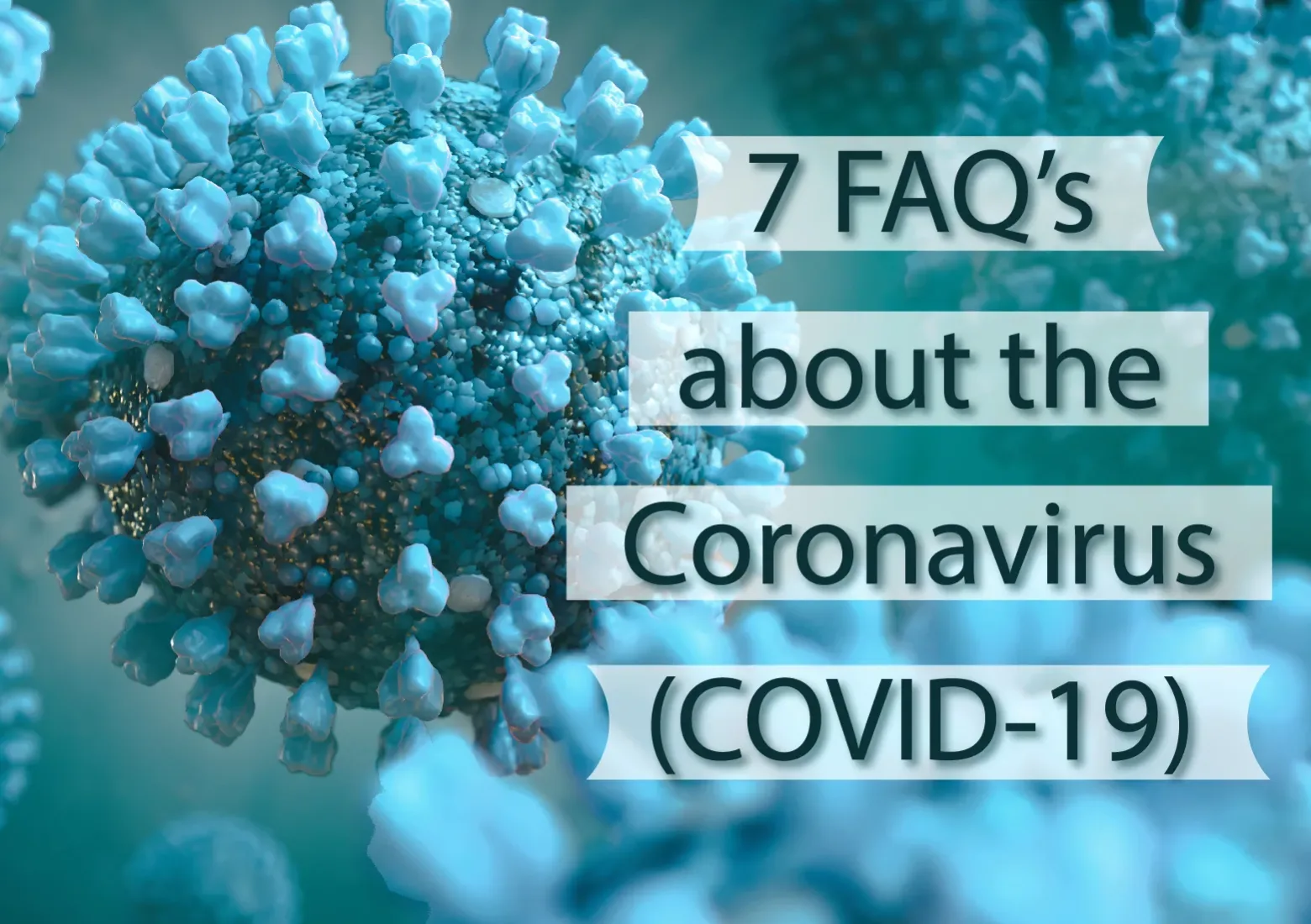7 FAQ’s About the Coronavirus (COVID-19)
March 6 • 2020

- Q1: What is the Novel (new) Coronavirus (COVID-19)?
- Q2: How is the Coronavirus spreading?
- Q3: Am I at risk for the Coronavirus?
- Q4: What are the symptoms of COVID-19?
- Q5: Are there preventable measures I can take to avoid COVID-19?
- Q6: What should I do if I’m showing COVID-19 symptoms?
- Q7: What are the treatment options for COVID-19?
As the number of COVID-19 (Coronavirus Disease 2019) cases rapidly increase, internationally and in the U.S., it’s important to equip yourself with knowledge and actionable measures you can take to help prevent and to stop the spreading of this virus.
Below are 7 common FAQ’s that will help you better understand and prepare for the Coronavirus outbreak.
Q #1: What is the Novel (new) Coronavirus (COVID-19)?
A: According to the CDC, the Coronaviruses are a large family of viruses that are typically found in people and animals. COVID-19 is a new disease, caused by a novel (new) coronavirus that has not previously been seen in humans. This disease causes mild illnesses, similar to the common cold.
Q #2: How is the Coronavirus spreading?
A: This outbreak was first discovered in China and has possibly been linked to a large seafood and live animal market, meaning it most likely emerged from an animal source. Since these findings, the CDC has discovered that this disease originally spread from animal-to-person, which eventually led to infect person-to-person. Unfortunately, this has led to community spread, meaning some who have become infected are unaware of how or from where/whom.
Q #3: Am I at risk for the Coronavirus?
A: Because this global condition has become a pandemic, more people are now at risk for exposure. However, those most at risk are; people over the age of 65, those who have underlying medical conditions (like chronic kidney or lung disease, moderate to severe asthma, heart disease, diabetes, severe obesity, and autoimmune disorders), and people who have recently been exposed to an infected person.
Q #4: What are the symptoms of COVID-19?
A: Reported illnesses have ranged from mild to severe respiratory illness, to even death with symptoms including:
- Fever
- Cough
- Shortness of breath or difficulty breathing
These symptoms may appear in as few as 2 days or as long as 14 days after exposure.
Q #5: Are there preventable measures I can take to avoid the Coronavirus?
A: Yes! The best way to prevent this illness is to avoid exposure to the virus, however, it’s possible to have (had) contact with someone who is unaware that they’ve been infected. Currently, the best measures to prevent COVID-19 include:
- Avoid close contact with people who are sick.
- Keep your hands away from your eyes, nose, and mouth.
- Cough or sneeze into the inner corner of your elbow, or in a tissue, then discard the tissue in the trash immediately.
- Wash your hands OFTEN with warm water and soap for at least 20 seconds, especially after using the restroom. If water and soap are not readily available, use an alcohol-based hand sanitizer that contains at least 60% alcohol.
Q #6: What should I do if I’m showing symptoms of the Coronavirus?
A: If you are sick and are showing similar symptoms related to the Coronavirus, it’s important to isolate yourself from others, such as family, friends, co-workers, and the general public. To help prevent the disease from spreading in your home and in the community, follow these steps below.
- Step 1: Stay home, except only to seek medical care ― please note that it is necessary to call your provider’s office BEFORE seeking medical attention.
- Step 2: Separate yourself from others and animals in your home.
- Step 3: Wear a facemask when you are around other people, pets, or before you enter a healthcare facility.
- Step 4: Cover your coughs and sneezes.
- Step 5: Wash your hands very often.
- Step 6: Avoid sharing personal household items, such as dishes, cups or glasses, eating utensils, towels, and bedding.
- Step 7: Clean and disinfect ‘high-touch’ surfaces frequently (counters, tabletops, doorknobs, bathroom fixtures, toilets, phones, keyboards, etc…)
Q #7: What are the treatment options for COVID-19?
A: Since there is no specific treatment or vaccine at this time, tests will not be available in U.S. hospitals or other primary care settings. Unfortunately, people may only seek medical care to help relieve their symptoms, but not cure them. However, if you feel sick with a fever, cough, and/or shortness of breath and think it may be related to the Coronavirus, it’s important to call your healthcare provider’s office before scheduling an appointment ― especially if you have recently traveled from an infected community or area in the last 14 days (China, Italy, Iran, South Korea, or Japan). Calling ahead will help your healthcare professionals determine whether the state’s public health department should be notified and need to further assist you.
Because this is a rapidly evolving condition, updated information will be posted by the CDC as it becomes available.